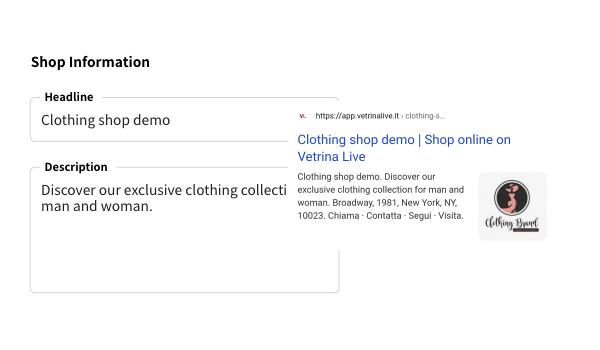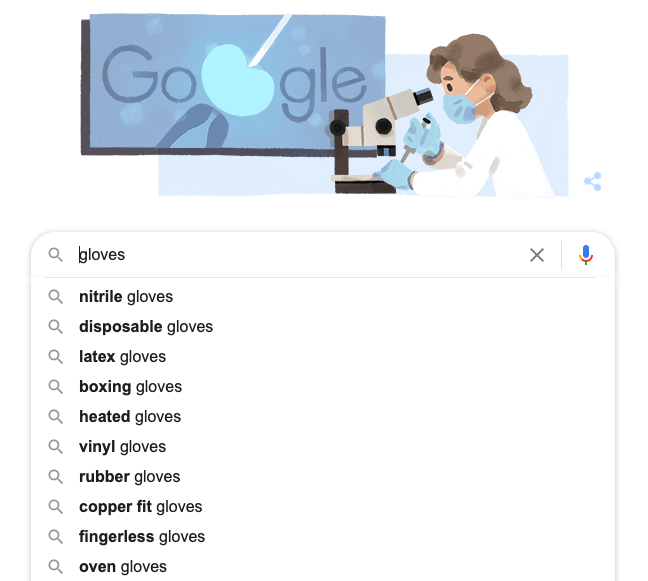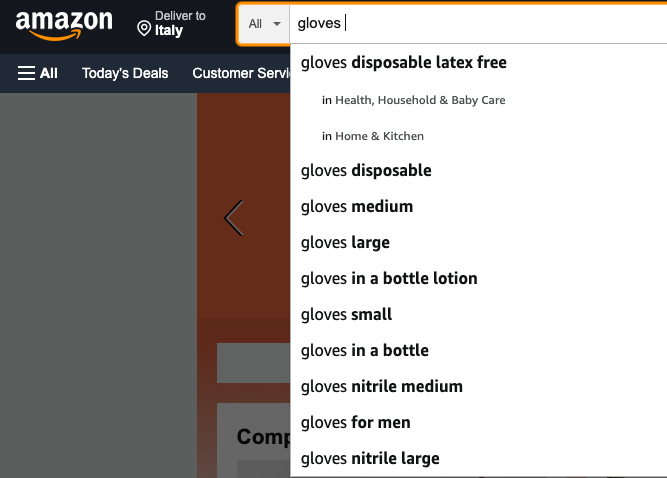Have you just created your online store with eye-catching products and photos and immediately tried to Google yourself without any success? Don’t worry, this is absolutely normal.
As you have read and heard many times, positioning on search engines is fundamental for your e-commerce because it increases the number of qualified visitors and consequently also the chances of generating a sale. It is not an automatic process but, on the contrary, in many cases it requires a lot of commitment and dedication. With Vetrina Live, however, you have advantages that will make some steps much easier than a standard e-commerce.
In order to correctly position your online store on search engines, it is necessary to implement a series of actions and precautions from a SEO (Search Engine Optimization) perspective which, in the long run, can lead to concrete results.
So before introducing to you this short guide on how to properly index your online shop, there are two factors you need to keep in mind:
- Timing: you have to be patient because SEO actions don’t give results the next day. Speaking of that, if you’ve tried to Google yourself unsuccessfully, we invite you to search for your business name again in 15 days to find out if you will appear in the search results!
- SEO advantages of Vetrina Live: if you develop your e-commerce with Vetrina Live you have the advantage of automating some processes, because the platform is already optimized for SEO.
The advantages of Vetrina Live from a SEO perspective
As mentioned before, creating an online store with Vetrina Live brings some SEO advantages that make optimization much easier than other e-commerces.
In a classic e-commerce, there is a whole series of technical and practical settings that, for those who are not experts or in the sector, could be complicated to configure. To name a few:
- Sitemap: it is a real map of the site, including all the URLs. It can be sent to Google and other search engines to index all the pages and products of the site more efficiently.
- Meta Tags: they are HTML tags that are used to describe the content of the page to search engines. For example, the Tag Title will provide Google with the title of the page, while the Tag Description will provide its description. The same also applies to products.

By creating your e-commerce with Vetrina Live, you won’t need to know this terminology, because the platform completely integrates with the creation of the shop itself. To be more precise, your online store sitemap is automatically generated and sent to search engines, so no action is required on your part.
On the other hand, the name of your showcase is automatically configured as a Meta Tag and so is the description. In this way, your showcase can be correctly positioned on search engines without any specific action on your part, except for some precautions that we list as simple suggestions:
Shop name
Simply enter your shop name. You can add a product category keyword to the name but without exceeding 50 characters.
Description in evidence
The description in evidence of the shop is fundamental because, as mentioned, it is configured automatically as a Meta Tag Description. An effective description is one that accurately describes what you sell, so avoid author phrases or descriptions that are too general.
The description is also used to attract customers who carry out research, so add a call to action at the end such as “Find out more”, or “Discover our catalog” etc., but without exceeding 160 characters.
The shop name and description automatically generate the snippet for the search engines, which means that when people search on Google, they will see exactly what you wrote.

The same applies to products. In fact, the name and description of the product are automatically set as html tags that allow indexing. In this way, your products will also be automatically indexed on search engines. So, now you may be wondering: “do I have to do absolutely nothing?”.
Although Vetrina Live simplifies a lot, compared to other solutions, the configuration of the settings for the index on search engines, there is a difference between being simply indexed and being correctly indexed on search engines.
In the following paragraphs we will try to make you understand, in a simple way, how search engines work and we will give you suggestions on how to best index your products.
What is SEO? How does it influence the positioning of my e-commerce and my products on the search results?
Search Engine Optimization (SEO) includes a series of practices aimed at generating organic traffic from search engines such as Google and Bing.

When you search on Google, for example, the search results page (SERP) shown includes both paid and organic results. The purpose of SEO is to get your showcase and your products to appear among these organic search results.
Clearly, the first thing to understand for a correct setup of your showcase is just how search engines think and what actually allows Google to show a certain result for a search.
Keywords are the answer
Search engines such as Google use advanced algorithms, which receive, among other things, continuous daily updates, to associate content with a specific search. When we enter a search keyword, in a few milliseconds the algorithm shows us the best results for that specific keyword and usually shows us exactly what we were looking for.
It follows that to be positioned on Google in the correct way, you must first consider the point of view of those who carry out the searches and define with which keywords they could actually search your showcase and your products.
How to choose the right keyword for a product?
Now that you finally begin to understand how search engines think, let’s see if there is a way to find out the most searched keywords on a particular product.
There are actually several, and in this guide we’ll show you the fastest and most effective one.
Search with auto-complete
The simplest tool to use is the search engine itself. We will use Google as it is certainly the most used one but on others it works in the same way.
You will surely have done a search by starting to type a few letters and Google will show you relevant suggestions as in the image:

Google’s suggestions are based on searches made by other users and therefore offer many insights into the most searched keywords for that given product.
The same procedure can also be performed on Amazon which is in fact the e-commerce par excellence:

As you can see, many results are actually the same between Google and Amazon which means that most of the user’s searches are the same on both search engines. Now that you know how to do it, try this procedure with your products and use the most searched keywords as the name of your products!
Conclusions
Indexing your online store on search engines does not require advanced technical knowledge thanks to Vetrina Live. All you need is an analytical approach to correctly define, also on the basis of web searches (Google, Amazon), the names and descriptions of your products and the categories associated with them. You always have to take the side of the researcher and try to offer a result.
If you have just opened your showcase or if you have been using it for some time, complete the configuration by following this simple guide and check the results in a few weeks.
Let us know what you think of this simple guide, and if you want to learn more or have other questions, leave a comment below.





